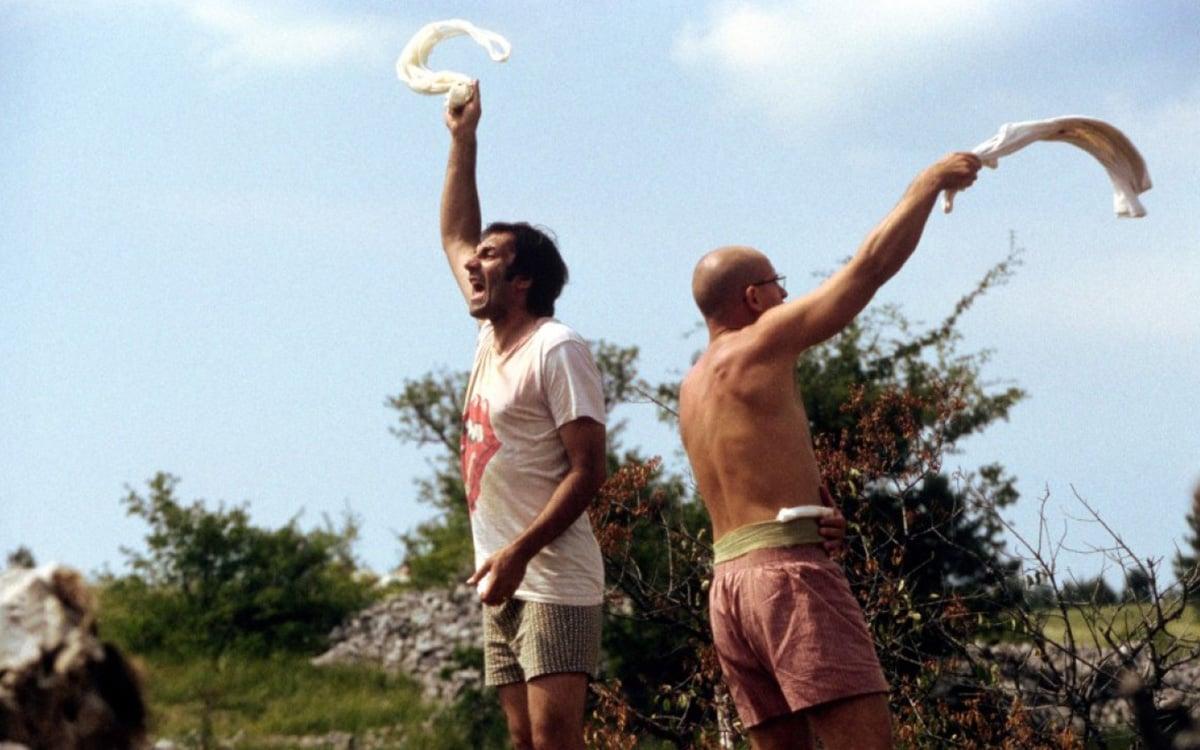No Man’s Land by Danis Tanovic (Review)

Is it any wonder that war has spawned subject matter for so many films? Of all of humanity’s endeavors (with perhaps the ironic exception of love), our battles provide endless movie fodder. Some movies focus on the adrenalized violence and action; just pick nearly any of Stallone’s or Schwarzeneggar’s early ’80s output. Others portray the madness of war (Apocalypse Now). Some movies portray the effects of war on those who fought and their loved ones (The Best Years Of Our Lives). Some focus on heroism and patriotism. And then there are some (Dr. Strangelove) that focus on the sheer absurdity of the whole thing.
No Man’s Land falls squarely in the latter category, as a sometimes humorous, but more often scathing look at the Serb-Bosnian conflict. And not just those who are firing the guns, but also at the media who are more concerned with getting the scoop than the humans they’re observing, and the UN Peace Corps who hope to avoid conflict and bad media relations rather than save a life.
Through misdirection and inexperience, two soldiers, Nino and Ciki, find themselves occupying a trench between the Serb and Bosnian lines. Nino is a green recruit, whereas Ciki is a bitter veteran. Both are wounded, and both hate the other’s guts. But to make matters worse, Ciki’s comrade Cera has been boobytrapped; if he’s moved, the mine underneath him will explode, killing all of them. Throw in a well-meaning but “in over their heads” group of French peacekeepers and an ambitious news reporter, and you’ve got a comedy of errors just waiting to unravel before your eyes.
As the movie progresses, it’s obvious that writer/director Tanovic is using Cera’s plight as a metaphor for the situation in Bosnia as a whole. The whole affair has become a powderkeg, with the UN forces fear of making a wrong move effectively neutering their usefulness. This makes for many jabs, subtle and gross, at the UN’s ineffectiveness, as well as its disdain for their mission.
Eventually, the situation’s absurdity simply becomes tragic. Although some viewers might hope for a happy ending, it becomes painfully clear that Nino and Ciki are never going to overcome the hate between them. And to rub salt in the wounds, poor Cera’s plight becomes little more than a political and ratings tool.
Of all the characters, I found the leader of the French peacekeepers, Marchand, to be the most interesting. He obviously wants to do the right thing, even if that means jumping in over his head and disobeying his superiors. But as the situation moves from bad to worse, he finds his actions running into a brick wall of bureaucracy led by a silver-tongued English officer named Soft (played by Simon Callow, whose performance is very reminiscent of Peter Sellers in Dr. Strangelove). But the film’s focus never leaves the situation’s depressing insanity, and Tanovic does a fine job of capturing it.
One minute, he has Nino and Ciki running around in their underwear trying to get their sides’ attention, the next he has them in a Mexican standoff over Cera’s body. The trailer (see below) has this thing played out like a comedy, a sort of Three Kings meets M*A*S*H. There may be some moments that bring out a chuckle or two (especially Nino and Ciki’s reactions to the foreign press), but the absurdity of it all is anything but a laughing matter. The movie’s final shot remains with you long after the credits, the ultimate symbol of this, and all wars’ futility.
